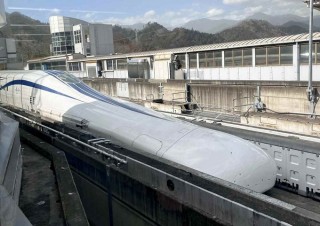Loading
Search
▼ Japan Touts Benefits of Maglev Project to Local Regions
- Category:Other
The launch of maglev train services will benefit local regions, according to a government draft of a new national land development plan.
A Land, Infrastructure, Transport and Tourism Ministry expert committee released the draft on Friday, as part of efforts to promote the Linear Chuo Shinkansen maglev project.
Amid an impasse linked to an unbuilt section in Shizuoka Prefecture, it remains to be seen whether this new plan will have an impact.
“The maglev system, which will connect the three major metropolitan areas of Tokyo, Nagoya, and Osaka in about an hour, will have a great effect. We will extend this effect to the rest of Japan,” transport minister Tetsuo Saito said at a press conference on Friday.
The current development plan compiled in 2015 emphasized the impact on the three major metropolitan areas by presenting a vision of a megaregion that will attract “people, goods, money and information from around the world.”
In contrast, the new draft highlights the advantages to regions other than the three major cities, and claims the maglev system will make it possible for people to move without changing jobs with the help of teleworking or to have second homes.
Stations are planned in Yamanashi and Nagano prefectures, and it is assumed the ministry has such areas in mind.
The draft also states how the line could benefit Shizuoka Prefecture, which has remained cautious about starting construction work for the maglev line in the prefecture.
Although there are six Shinkansen stations in Shizuoka Prefecture, the Nozomi Shinkansen trains of the Central Japan Railway Co. (JR Tokai) do not stop at these stations.
According to the draft, the congested Shinkansen schedule could be eased as the demand for Nozomi trains will be shifted to the Linear Chuo Shinkansen when maglev services start. As a result, the number of Hikari and Kodama trains stopping in the prefecture will increase.
The draft is expected to be approved by the Cabinet this summer.
The Linear Chuo Shinkansen is a major project that is costing JR Tokai ¥9 trillion.
In October 2017, Shizuoka Gov. Heita Kawakatsu expressed concern that tunneling in the southern Japanese Alps could reduce the flow of the Oi River, which delayed the start of construction of the Shizuoka section.
“The maglev project is more than five years behind schedule,” former JR Tokai President Shin Kaneko has said.
JR Tokai’s initial plan of opening the Tokyo-Nagoya section in 2027 is unlikely to be achieved.
- May 28, 2023
- Comment (0)
- Trackback(0)


